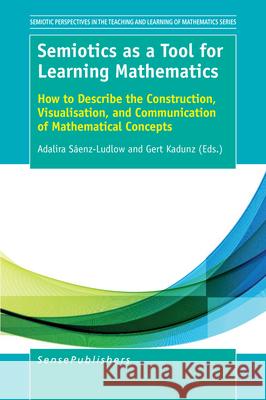Semiotics as a Tool for Learning Mathematics » książka
Semiotics as a Tool for Learning Mathematics
ISBN-13: 9789463003360 / Angielski / Twarda / 2016 / 232 str.
Semiotics as a Tool for Learning Mathematics
ISBN-13: 9789463003360 / Angielski / Twarda / 2016 / 232 str.
(netto: 421,88 VAT: 5%)
Najniższa cena z 30 dni: 425,63
ok. 22 dni roboczych.
Darmowa dostawa!
Semiotics as a Tool for Learning Mathematics is a collection of ten theoretical and empirical chapters, from researchers all over the world, who are interested in semiotic notions and their practical uses in mathematics classrooms. Collectively, they present a semiotic contribution to enhance pedagogical aspects both for the teaching of school mathematics and for the preparation of pre-service teachers. This enhancement involves the use of diagrams to visualize implicit or explicit mathematical relations and the use of mathematical discourse to facilitate the emergence of inferential reasoning in the process of argumentation. It will also facilitate the construction of proofs and solutions of mathematical problems as well as the progressive construction of mathematical conceptions that, eventually, will approximate the concept(s) encoded in mathematical symbols. These symbols hinge not only of mental operations but also on indexical and iconic aspects; aspects which often are not taken into account when working on the meaning of mathematical symbols. For such an enhancement to happen, it is necessary to transform basic notions of semiotic theories to make them usable for mathematics education. In addition, it is also necessary to back theoretical claims with empirical data. This anthology attempts to deal with such a conjunction. Overall, this book can be used as a theoretical basis for further semiotic considerations as well as for the design of different ways of teaching mathematical concepts.
Semiotics as a Tool for Learning Mathematics is a collection of ten theoretical and empirical chapters, from researchers all over the world, who are interested in semiotic notions and their practical uses in mathematics classrooms. Collectively, they present a semiotic contribution to enhance pedagogical aspects both for the teaching of school mathematics and for the preparation of pre-service teachers. This enhancement involves the use of diagrams to visualize implicit or explicit mathematical relations and the use of mathematical discourse to facilitate the emergence of inferential reasoning in the process of argumentation. It will also facilitate the construction of proofs and solutions of mathematical problems as well as the progressive construction of mathematical conceptions that, eventually, will approximate the concept(s) encoded in mathematical symbols. These symbols hinge not only of mental operations but also on indexical and iconic aspects; aspects which often are not taken into account when working on the meaning of mathematical symbols. For such an enhancement to happen, it is necessary to transform basic notions of semiotic theories to make them usable for mathematics education. In addition, it is also necessary to back theoretical claims with empirical data. This anthology attempts to deal with such a conjunction. Overall, this book can be used as a theoretical basis for further semiotic considerations as well as for the design of different ways of teaching mathematical concepts.











